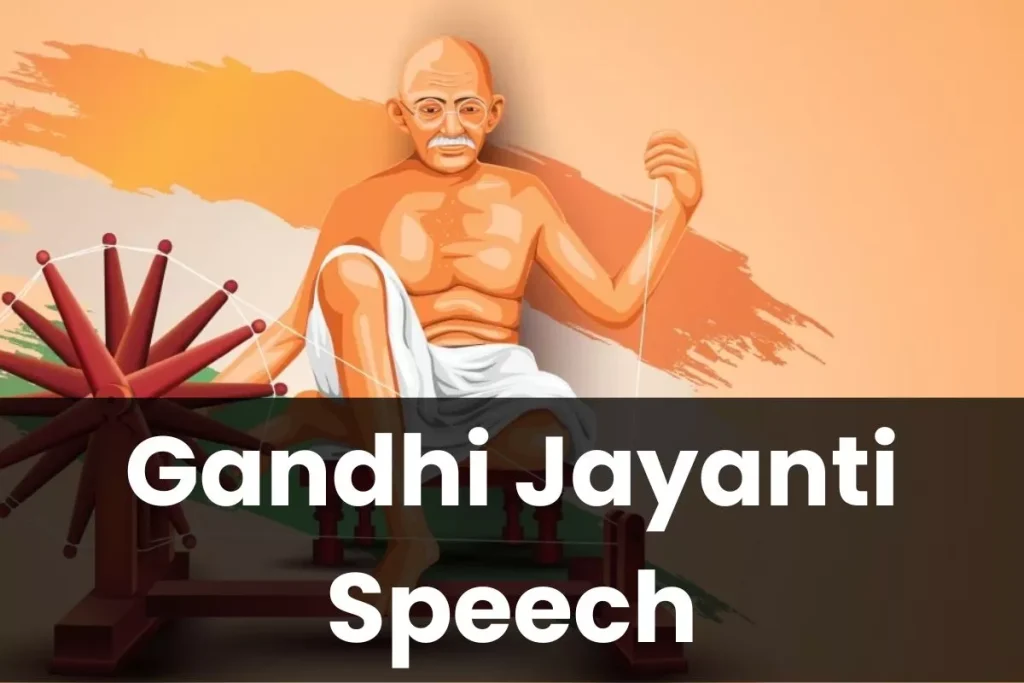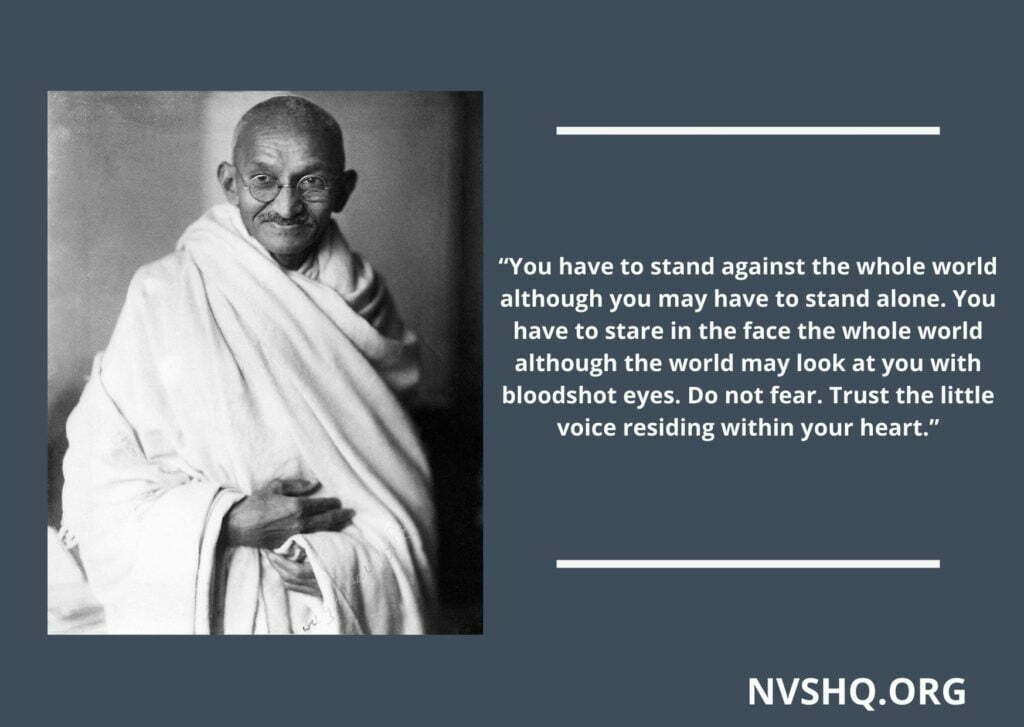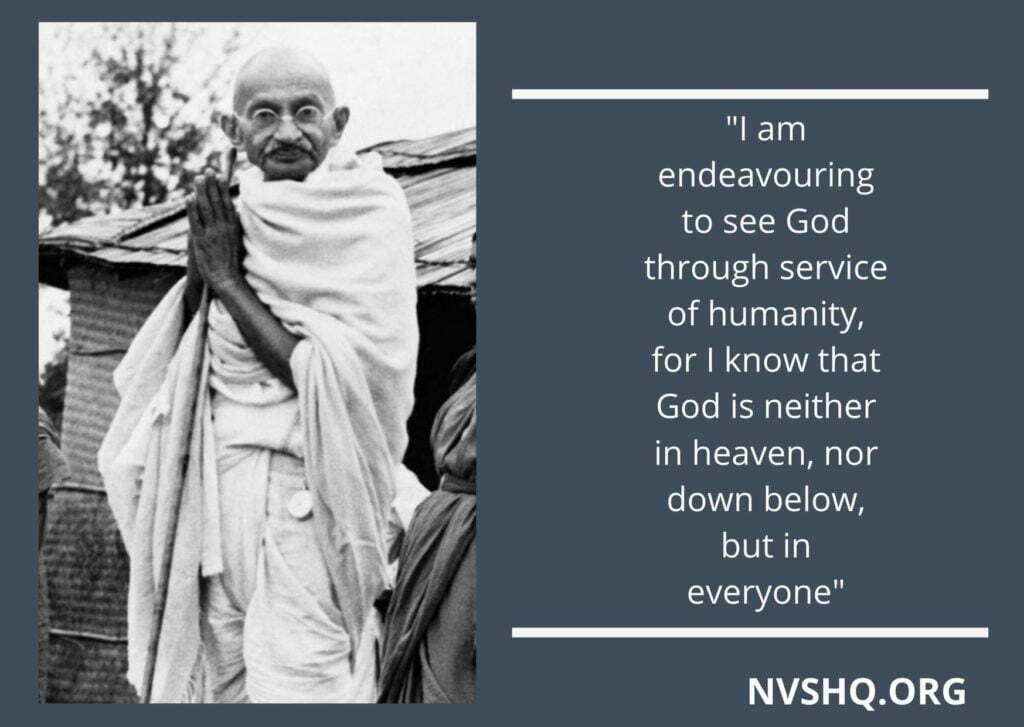Gandhi Jayanti Speech: Gandhi Jayanti is celebrated each year to commemorate the birth anniversary of the man who led the fight for freedom with ‘Non-Violence’, Mahatma Gandhi. His birth anniversary is of great significance not only in India but also in other countries. On his birth anniversary, students perform and present the Gandhi Jayanti speech.
If you’re also looking for the best Gandhi Jayanti speech describing the legendary man. Then, you have landed on the right page. `Here we are presenting the Gandhi Jayanti Speech for students and children. We have divided this Gandhi Jayanti speech into two heads, a long speech and a short speech, to help students and Children disperse the ideologies of Gandhiji.

Gandhi Jayanti Speech for Students (Long)
“An eye for eye, only ends up making the whole world blind”
Mahatma Gandhi
Mohan Das Karamchand Gandhi, the Father of the Nation. An Individual of high merit and a man of high wisdom. Such was his wisdom that influenced the world and the one, who was a firm believer of the path of Truth and non-violence.
Good Morning to All!
My name is ‘your name‘. Today on the occasion of the Gandhi Jayanti, we all have assembled here to celebrate the birth anniversary of the greatest man of all time, ‘Mahatma Gandhi’.
Born in 1869, at Porbandar, Gujarat. This year, in 2023, it is the 154th birth anniversary of the man who was ahead of his times. His Ideologies of Non-Violence and Ahimsa impacted the lives of many Great individuals like Martin Luther King Jr. and still don’t fail to influence our lives today. For the people of India, he was ‘Bapu’ (father). Subhash Chandra Bose entitled him as the ‘Father of the Nation’. People also referred to him as ‘Mahatma’, meaning, the one with the greatest soul.
Gandhiji was a Lawyer by profession. At 19, he went to London, to complete his higher studies. He studied law there. Post the completion of his studies, he went to South Africa with his wife Kasturba Gandhi and resided there for many years. He led a simple life there but remained active in the movements that led to fighting injustice against the Indians living in South Africa.
His struggle against injustice and unlawful acts began with the Civil Disobedience Movement in Africa, which started in 1906. Gandhiji fought for eight years in South Africa against the Transvaal government concerning the registration of Indians. Indians were made to pay unlawful taxes. During the Movement, many Indians residing in South Africa were shot dead, and many were left jailed in severe atrocities.
His journey from a simple man to a National leader was a remarkable one. Often in his practice days, some incidences left him questionable to his identity as an Indian man whose country is ruled by another country. Once, In the courtroom, Gandhiji was asked to put off his turban, which made him helpless to act nothing but leaving the courtroom. In addition to all this, there were several incidences where Gandhiji faced crucial discrimination by the white people just because of being a non-white in a white country.
So, how did this fire of freedom ignite in him?
The resistance of Gandhiji towards colonial rule was unassertive until one train journey which changed the whole perspective and purpose of his life and gave India, a leader like him. A train journey in South Africa, where Gandhiji was thrown out of a First Class Compartment just to not give his seat for a European Passenger, ignited the fight of freedom in him and made his return back to India forever, to free India.
His last visit to India was a final return in 1914. Upon his return to his homeland, he started the movement of independence in 1917 with the Champaran Satyagraha. After which he joined the Indian National Congress in 1920. The fight of Mahatma Gandhi started with the Satyagraha, a non-violent movement, a fight of truth and lawful. After coming back to India, some of the major people-led movements started by him were, the Civil Disobedience Movement, Quit India Movement, Non-Cooperation Movement, and the famous Dandi March in 1930, in which thousands of Indians joined the campaign and travelled through 385 km on foot. The movement actually brought people together to fight for the freedom of all.

At several points in his life, Gandhiji was Imprisoned by the British government, but he never chose the path of violence, instead gave his voice more power by doing strikes for days, with no food.
His contribution to the lives of Indian People is undebatable and we Indians are truly indebted by his sheer dedication to providing us with a free country in, which we reside today. He struggled through many years to provide independence to India from the locks of British rule. It was the outcome of his struggles, that India gained Independence. He made it possible, not with force or violence but with the message of Peace.
With 200 years of British rule, Indians had actually accepted the British rule as their fate and left the very thought of attaining freedom, with all the failed attempts. But it was only Mahatma Gandhi that again ignited the fire of freedom in the heart of the Indian people. His actions were subtle, yet influential enough to create a mass movement against the British and ignite the fire of freedom, in every Indian who had been enslaved for so long.
Beyond his sheer dedication to the freedom of India. He was also an Individual with high values. His life is a learning book of its own. Mahatma Gandhi was a firm believer of Right living. Living his life in his Khadi attire, he spun his own clothes and never wasted food. Not only he make his living, a remarkable one but also urged Indians to reduce their dependency on foreign textiles. His movement favouring the adoption of Khadi led people to adopt Khadi and abandon the textiles bought over by the Britishers.
In addition to this, Mahatma Gandhi particularly focused on the issues of cleanliness, which were never addressed before. Today, the current Prime Minister of India added to the value of Gandhi Jayanti with the launch of the Swacch Bharat Abhiyan to incorporate the habit of Cleanliness in the people of India and not forget the values of our ‘Bapu’.
Another issue about which Gandhiji was quite peculiar was the ‘treatment of untouchables’ of that time. He was stringent against the injustice done to the so-called ‘untouchables’. It was he who addressed such people as ‘Harijans’ and gave them the title of the Children of God, to not let people use other disgraceful words for them. To affirm the idea, he also published journals named Harijan, Harijan Sevak, and Harijan Bandhu in 1933 in Gujarati, Hindi and English.

Post-independence, he worked for the Unity of Hindu-Muslims which was influenced at most, under all these years of British rule which was the ultimate cause for them to rule over us. He never favoured the partition of India but did it for the peace of the disputed communities. On June 15, 2007, the United Nations declared Gandhi Jayanti as the ‘ International Day of Non-Violence. Every year, the Prime Minister of India pays a tribute to the Raj Ghat, by offering flowers and prayers to his soul, alive in every Indian.
Even though it was the path of Non-Violence that gave us freedom, the contributions of other freedom fighters cannot be disregarded. We are indebted to the sacrifices of such elite souls. Gandhi Jayanti is an occasion to inspire the people of India and their intrinsic value of no violation against any living being. Life of Mahatma Gandhi is a lesson, to incorporate, learn and practice each day. I believe, his words and life will never fail to influence you and make you carry his wisdom all along through.
Thank You
Gandhi Jayanti Speech for Children (Short)
Good Morning to all!
Gandhi Jayanti is celebrated every year on 2nd October. The day is celebrated to commemorate the birth anniversary of the greatest man of all time, Mahatma Gandhi.
The birth anniversary of Mahatma Gandhi is of huge significance to all Indians. The occasion of Gandhi Jayanti is a Proud moment for all and is celebrated with great enthusiasm. On the Raj Ghat, garlands and flowers are presented over the Samadhi of Gandhiji.
Today, the whole world is a follower of the teachings of Mahatma Gandhi, which gave value to India and the world. The world follows his teachings and his Ideologies of Non-Violence and Ahimsa, but they still don’t fail to Impact the lives of people.
His efforts helped India attain freedom from the long colonial atrocities of British Rule. He was a great freedom fighter who never used violence as a tool to revolt against the British. He died on January 30, 1948.
To celebrate the occasion of Gandhi Jayanti, many schools arrange programs highlighting the contribution of Gandhi Ji to the life of the people of India. The teachings of Gandhi are presented. Various rallies, Competitions and seminars are organized to integrate the values of Gandhi on each individual of India. People of all religions celebrate this day because he worked across societal barriers and worked for all.
His teachings are still discussed today and will be discussed for ages.
Thank You
FAQs
Why do we celebrate Gandhi Jayanti?
Gandhi Jayanti is celebrated to symbolize the birth anniversary of Mahatma Gandhi, who led movements for the freedom of India from British Rule.
When did Mahatma Gandhi come back to India?
Mahatma Gandhi came back to India in 1893 and went back to start practising his law. But after facing continuous atrocities in South Africa, he finally returned to India in 1914.
When is the International Day of Non-Violence?
International Day of Non-Violence is celebrated on 2nd October, the birth of Mahatma Gandhi.
What were the three Harijan journals published by Mahatma Gandhi?
Mahatma Gandhi published journals named Harijan, Harijan Sevak and Harijan Bandhu in 1933.
When did Mahatma Gandhi die?
Mahatma Gandhi died on January 30, 1948.
When did India part from Pakistan?
The partition of India, happened in 1947, creating India and Pakistan.
When was Mahatma Gandhi born?
Mahatma Gandhi was born on 2nd October in the year 1869, at a village in Porbandar of Gujarat.
For how many years, did Mahatma Gandhi live in South Africa?
Mahatma Gandhi lived in South Africa for about 20 years.
What was the Salt March?
Salt March, also known as the Dandi March took place in 1930. It was an on-foot march through Gujarat. The march started from Ahmedabad and ended on the coast of the Arabian Sea. It was joined by thousands of Indians, making their own salt and standing up against the illegal tax on salt.
When was Mahatma Gandhi arrested by the British?
Mahatma Gandhi was arrested by the British in 1922, where he remained in prison for two years.






